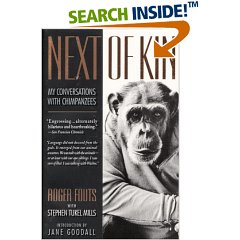They are Life On Air - Memoirs of A Broadcaster by Sir David Attenborough

and
Next of Kin - My Conversations With Chimpanzees by Roger Fouts

For animal lovers out there, these are absolutely fabulous books that you MUST read. I was suggesting to Banana Booze , the only person I could think of that might be of slightest interest, to read these books. I couldn't think of anybody else... there's nobody else whom I can share my thoughts about these books with... I thought of Banana Booze, so I MSN him and like a mother nagging a son to do this do that, I was telling him how wonderful these books are.
 And like my brother who couldn't find any to share his love for anime and comics with, I felt the same "loneliness" not being able to share my love for these two books. And so, blogging is my best channel, though hardly anyone reads my blog.
And like my brother who couldn't find any to share his love for anime and comics with, I felt the same "loneliness" not being able to share my love for these two books. And so, blogging is my best channel, though hardly anyone reads my blog.  hehe...
hehe...Life On Air, as the name implies, talks about Sir David Attenborough's life about wildlife film making from young till now, well, till the book was written of course. It is really interesting. He told of the development of film making, the encounters, the interactions with animals. The best anecdotes among it, I thought, was when he's supposed to be talking about the importance of the "opposable thumb" of gorillas. There he laid among a few gorillas which Dian Fossey was studying (he didn't just "barge" in with the gorillas, they spent about a week "introducing" themselves to the gorillas).
Excerpts from the book :
I crawled slowly towards her (a female adult gorilla). She looked at me in such a placid way that I was encouraged to crawl a little closer. I lay on my side and turned to look at the camera. That inevitably meant that I had to turn my back to her. I didn't like doing that. Martin (the cameraman) seemed to be ready. There was a noise from behind me. I turned and saw her heaving herself towards me. She stretched out a huge black hand, put it on the top of my head, and looked at me with her deep brown eyes. This didn't, after all, seem to be the right moment for a chat about the opposable thumb. She removed her hand from my head and pulled my lower lip to look inside my mouth. I felt a weight on my legs. Two youngsters, the size of chimpanzees, were trying to undo my shoelaces.
I felt in no way alarmed or even threatened. I had, it is true, crawled towards them, but it was the female who had made the first physical contact. She and the youngsters seemed to have accepted me as a welcome visitor, almost as a member of their group. My overwhelming feeling was one of privilege. I lay there for five minutes, almost holdin gmy breath with delight. The female resumed her feeding. Eventually, the youngsters got bored with my boots and galloped away to look for something else to investigate. The female followed them and I crawled back to my companions.
"Well, we got a bit of it, " said John.
A bit? I had been there for five minutes or more. Was there a camera fault or something?
"No," said John, "but I was waiting for you to say something about the opposable thumb. Martin only had about fifty feet in the camera before he would have to reload and I didn't dare take any general shots in case you started to speak and we ran out of film. And anyway, the way you were playing with them looked so extraordinary that viewers would have thought they were tame gorillas in a zoo. Then Martin said why not take a few feet to give the boys in the editing suite a laugh. So, yes - we did get a bit."
Very funny, I thought.
The truth is, there hardly are any chance for human to be so close to the gorillas and the gorillas were so calm and comfortable to the extend that they allowed their youngster to play with the human.
There are countless interesting anecdotes in the book. Well, actually, the only less interesting part of the book is when Sir Attenborough talked about BBC's administration. Basically everything in the book is very captivating.
Then, Next of Kin. Chimpanzees are one of my favourite animals. The book talks about the research of teaching chimpanzees human sign language. They did so in a non-forcible and non-rewarding way, to make it short. That is, they did not use "reward" when the chimps used the sign language. Using reward will condition the chimpanzees to use sign language only to get food, etc. In the end, the chimps learned to communicate with human volunteerily. They even signed to themselves when they were alone, just as we human would talk to ourselves at times. This showed that they do not use sign language to get rewards but really have "adopted" this human language into their lives.
It is totally fascinating. The dreams of human to communicate with another species, HAS NOW CAME TRUE.
The most famous chimpanzee, Washoe, even taught her adopted son Loulis sign language without being prompted by the researchers and without any human interference.
One of the researchers failed to visit Washoe on a regular basis as she had had a miscarriage. She stopped seeing Washoe for a few days. When she returned, Washoe gave her a cold shoulder. The researcher signed sorry to her, and she signed to her, that her baby died. Washoe has had her babies died twice. She understood what that means. She looked at the researcher intently, looked away, and looked back in the eyes of the researcher, and she signed "cry".
Amazing, isn't it? Clearly, animals felt grief as we human do. Chimpanzees are known to grief to their death. Not only chimpanzees, many other animals, meerkats, wolves, dogs and many others. In my opinion, there should not be any doubts that animals have emotions. Anyone who ever owns a dog will know that. But unbelievably, there ARE people who still believe that human are special and "superior" because we have emotions and animals don't.
It broke my heart and cried (yeah, I really did shed tears..) when I read about bio labs that were existing in the 80's. The cruel and unhumane treatment to the "subjects", the animals that so unfortunately landed in bio labs. I have no idea if such cruel treatments still exist in our time now. But it's really sad to even read about the condition in the lab, let alone eye-witnessing it, which the author Roger Fouts and Jane Goodall did.
Roger Fouts went to visit a chimpanzee, Booee, whom Fouts couldn't save and landed in one of the many bio labs then. He hesitated before going because it was going to be an agonizing visit as he knew damn well there's nothing he can do to get Booee out of the lab due of many factors. But his visit was going to put on air (the 20/20 of ABC) and it'll be a great chance for people in the world to know about the suffering of chimpanzees in the lab.
Booee knows sign language. He hadn't seen Fouts for over 20 years or so. Fouts hoped Booee doesn't recognise him but, he did.
Excerpts from the book :
I hesitate for another moment, then entered the room in a low crouch. I approached Booee's cage uttering gentle chimpanzee greetings.
A big smile lit up Booee's face. He remembered me after all.
HI BOOEE, I signed. YOU REMEMBER?
BOOEE, BOOEE, ME BOOEE, he signed back, overjoyed that someone had actually acknowledged him. He kept drawing his finger down the center of his head in his name sign - the one I had given him in 1970, three years after NIH researchers had split his infant brain in two.
YES, YOU BOOEE, YOU BOOEE, I signed back.
GIVE ME FOOD, ROGER, he pleaded.
Booee not only remembered that I always carried raisins for him, but he used the nickname he had invented for me twenty-five years earlier. Instead of tugging the ear lobe for ROGER, he flicked his finger off the ear. This was like calling someone "Rodg" instead of "Roger". Seeing him sing my old nickname floored me. I had forgotten it, but BOOEE hadn't. He remembered the good old days better than I did.
I gave Booee some raisins, and the years just melted away, the way they do between old friends. He reached his hand through the bars and groomed my arm. He was happy again. He was the same sweet boy I met on that autumn day decades earlier when Washoe and I first stepped onto the chimpanzee island at Lemmon's Institute.
....
....
....
As we signed back and forth and played CHASE and TICKLE through the iron bars, I forgot about the cameras and the millions of people who would be watching this. For one wonderful moment I even forgot where we were. But only for a moment.
I MUST GO NOW, BOOEE, I signed after a while. Booee's grin changed to a grimace, and his body sank. I MUST LEAVE, BOOEE. Booee moved to the back of his cage. GOOD-BYE, BOOEE.
....
....
The 20/20 show was broadcast on May 5, 1995. Its portrayal of Booee, a nonhuman person trapped in biomedical research, affected a nationwide audience more powerfully than I ever could have imagined.
....
....
Donations poured into ABC from sympathetic viewers hoping to fund Booee's retirement from research. LEMSIP was besieged once again by a public that demanded amnesty for chimpanzees. In October 1995, five months after the 20/20 broadcast, LEMSIP gave Booee and eight other adult chimpanzees their freedom. They were shipped by truck to the nonprofit Wildlife Waystation, in California, where they settled into a new "retirement home" that has large, airy and sunlit rooms with sagebrush views.
....
Booee still carries the incurable disease that LEMSIP researchers gave him, but he has no symptoms yet that we know of.
A few months later, Debbi and I went to see Booee in his new home. He was so happy to see us. We spent the morning grooming, playing and signing. When it was time for us to leave, Booee wasn't upset. He stood at his enclosure and calmly signed GOOD-BYE.
2 years ago, the first time I read until here, I couldn't "forbid" my tears from running down my face in the train. (I can't believe 2 years has passed since I bought the book...) When I re-read it again now, I still had tears running down my face. I cannot imagine how heartbreaking it is when the author visited Booee and had to leave...
Animal study is a tough study, especially behavioral study. It's not all glamorous and fame. They spent years and years in the jungle, at sea, recording every tiny details of the animals behaviour in order to understand them. Love animals as I do, I seriously doubt that I'd have the capability to do just that. It takes tremendous patience. And I salute all the scientists out there for dedicating their lives trying to understand animals.


No comments:
Post a Comment